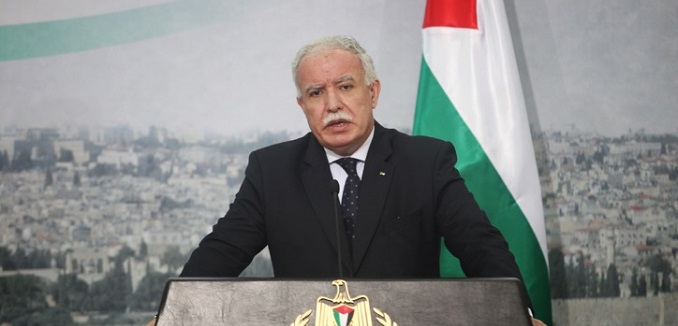Ninety-nine years after Lord Arthur Balfour pledged British support for a “national home for the Jewish people” in what is now Israel, Palestinian officials announced their intention on Sunday to sue the United Kingdom in an international court for issuing the document.
Palestinian Authority Foreign Minister Riyad al-Malki asserted during an Arab League meeting in Mauritania that the Balfour Declaration was a direct cause for the “Palestinian Nakba”—the Arabic term, meaning “catastrophe,” used to describe the founding of the State of Israel and the ensuing war and refugee crisis.
“We are working to open up an international criminal case for the crime which they committed against our nation – from the days of the British Mandate all the way to the massacre which was carried out against us from 1948 onwards,” al-Malki said. “With the commemoration of 100 years since this historic massacre, and following the continuity of this tragedy, we request that the Secretary General of the Arab League assist us in prosecuting the British government for publishing the Balfour Declaration which caused this catastrophe against the Palestinian people.”
Al-Malki also urged the Arab League members to avoid any sort of cooperation with Israel, even on security issues. Leaders from Saudi Arabia and Egypt, two of the most important countries in the Arab League, were not present at the summit; those two countries are among those that have strengthened their ties with Israel in recent years due to shared security threats from Islamist terrorism and Iranian regional expansionism.
Israeli Public Security Minister Gilad Erdan said that the lawsuit had little legal basis, and instead appears to be a new move by Palestinian leaders to avoid direct peace talks. “Palestinian leaders haven’t been interested in peace for some time already,” Erdan told Haaretz. “The only goal is to delegitimize Israel. Don’t be surprised if the next phase will be an expansion of the Palestinian claim against Britain, and France as well since they were also partners in the Sykes-Picot agreement that divided control in our region….Everything is kosher in [Abbas’] path of lies and incitement.”
The Balfour Declaration, issued on November 2, 1917, was the first time that the Zionist movement received explicit support from a government towards the establishment of a Jewish homeland in what would become the Mandate of Palestine.
His Majesty’s government view with favour the establishment in Palestine of a national home for the Jewish people, and will use their best endeavors to facilitate the achievement of this object, it being clearly understood that nothing shall be done which may prejudice the civil and religious rights of existing non-Jewish communities in Palestine, or the rights and political status enjoyed by Jews in any other country.
The Mandate, established in 1922 by the League of Nations, recognizes the “historical connection of the Jewish people with Palestine and to the grounds for reconstituting their national home in that country.”
Article 20 of the charter of the Palestine Liberation Organization, whose chairman Mahmoud Abbas is also president of the Palestinian Authority, declared that “The Balfour Declaration, the Mandate for Palestine, and everything that has been based upon them, are deemed null and void. Claims of historical or religious ties of Jews with Palestine are incompatible with the facts of history and the true conception of what constitutes statehood.” In 1993, PLO chairman Yasser Arafat promised, as part of the Oslo peace process, to revoke elements of the charter that denied Israel’s right to exist as part of the Oslo peace process. After initially failing to keep his commitment, Arafat specified in a 1998 letter to President Bill Clinton that Article 20 would be among those that would be revoked. In December 1998, the Palestinian legislature officially voted to revoke those sections of the charter that were inconsistent with the Palestinians’ commitment to peace. By questioning the legality of the Balfour Declaration, the Palestinian Authority may be in violation of its international commitments to peace.
[Photo: Issam Rimawi / Flash90]




